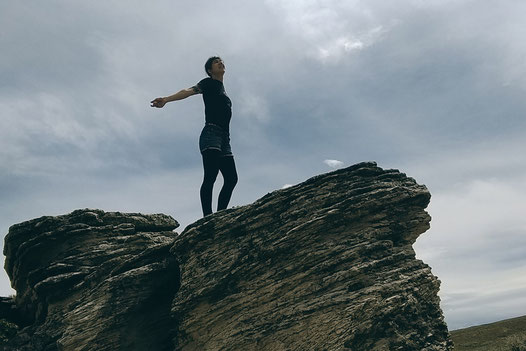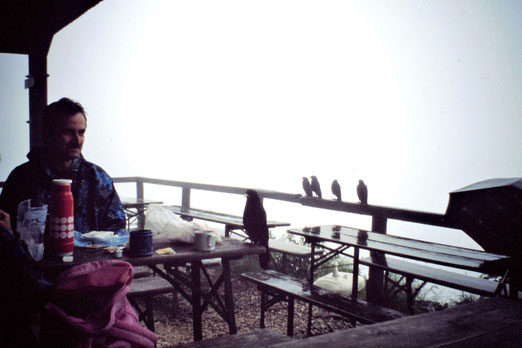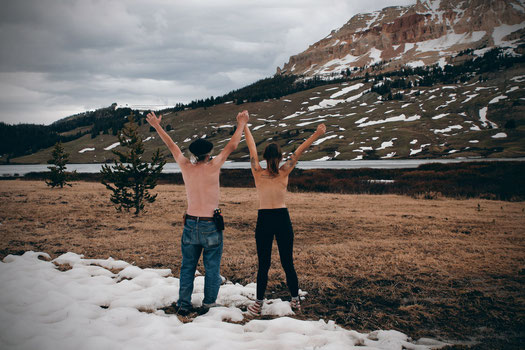Call of the Mountains -
An unfathomable Desire.
July 5, 2019

Wind tears the blaring silence apart like a velvet curtain on a stage in complete darkness. Dry grass bends over in the invisible air currents until it touches the dusty ground. A single ray of sunlight shoots out between the clouds like a laser. It strikes on the green hills that unfold over the earth like the fabric of a precious dress. The call of a crow resounds from the stone walls back through the valley, sharp and dry like bursting autumn leaves.
These are the only sounds on that evening, just before the golden hour, before the sun disappears behind the black edges of the rocks. Are they? I am standing at the top of a ridge of hills and stare at the high mountain formation on the horizon. White fragments of clouds hang in the summits, as if they would reach for them with claws. Dark rock stands out against the snow like an interference on television. I am standing completely still. I stop breathing. The wind cuts into my ear with a wild whistling. There is something else.
My eyes are fixing the mountain range - and the mountains seem to look back. I feel something like a second heartbeat inside of me. Something surreal and unexplainable that gives me the creeps. I want to run. Through the valleys. Up to the bottom of the mountain massif. Then further up. Higher. Until the air in my lungs starts to burn and I can feel pain in my legs. Heat, sweat, cold, bone on stone, sky over head.
The call of the mountains. The call of a challenge as repulsive as it is attractive. Like a siren in a moor. I stand can hear it. It's a silent call no one else can notice. With the intensity of an electric shock. Here comes the attempt to explain the fascination of mountain hiking.
Hiking to an Ice Cave completely in the Fog

The Calanques: Sweat and a breathtaking View

2015. My best friend Dani and I are on a roadtrip along the Côte d'Azur in Southern France. "I found something we need to see: the Calanques!" Dani says. It is a mountain massif that is lapsing into the sea like fjords. The area is close to Marseille, 12 miles long and 3 miles wide. We decide to go on a hike.
It is hot as shite at the end of September. We're climbing over boulders and slippery rocks. Above us sand-coloured stone, below us turquoise-blue water. My eyes are burning like crazy because of the sweat, my feet are boiling and my backpack is glued to my shirt. But I burst into enthusitic screams as I look around. Next to us the abyss, in front of us the mountain slope with its light green trees, which lie on the ledges like chocolate sprinkles.
When I now think back to those two experiences, I suddenly understand what happened between me and the mountains: I can only feel and truly experience them when they challenge me. When I can grasp them with my hands, when I can press my legs against the stone, when my muscles tremble and when nature can strike me in the face with the force of its sheer existence.
No cable car ride with a nice summit photo. It was the wrong approach - like a miserable first date.
Mountaineering: About Crashing and Getting up again

2019. I'm in the Rocky Mountains for five months where my boyfriend lives. He spent half of his life in the mountains and doesn't think 10F is cold. He only leaves a burning trail of dust on the slope, while I am snorting behind like a rhino.
We met two years ago out here - on my big solo trip across the USA. Besides a thousand other little things, we share the sensation of adventure, nature, risk and venturing beyond our limits.
In May we are climbing up a mountain side that does not show any official path. Instead, there are only burnt-out tree ruins and a lot of scree.
"I want to go up all the way. Up to the Hoodoos," I say. So let's go! At two thirds of the ascent it gets so rough that the whole ground starts to slide and we shoot headlong a few feet into the valley. It takes a couple of minutes until we can think again and realize that we still have both arms and legs.
"What are we going to do now?" my boyfriend asks.
"Going further up to the top?" I ask back and set my foot towards the summit. It's not a real question.
The summit is the answer.
But is it?
The endless Search for the Last Summit

Not really. Because behind every summit a new mountain top is lurking. The trip never ends. The longing to find the point where it doesn't go further mixes in a toxic-exciting way with the desire to find an endless way to go on.
Everything hurts and I'm not on my way back by any chance. But I can prove to myself and the mountain that it's possible. Me and the mountain. There's not much in between. It is neither a conflict nor a true cooperation. The mountain is here and I am here. Being is the experience that creates the most intense tension.
When I go up, I don't want to defeat the mountain. Too great is my respect for the rocky elegance, the brutality of beauty and the rugged silence where the air gets thinner and the temperatures fall like the tiny stones under my feet. I don't want to hoist a flag or put a cross in the ground when I reach the top. I just want to be. Feel the cold and the rain, snowflakes on my lips and heat in every pore of my skin. Far away from buildings and infrastructure built by people. From streets and shops, restaurants and air conditioners.
Everything I've got and need is in my backpack. Water, food, a first aid kit, a rain jacket, gloves, a map, my camera. Sounds like nothing and is the opposite: ultimate freedom.
The Mountain - My Church

But you also have the "freedom" to find your limits. When the supplies are used up, there's seldom a way to refill. When the weather turns, you don't want to be on top of a ridgeline. When your strenght lessens, you cannot just lay down for a nap in a vertical wall.
I have to take water, physical and mental condition, the route, elevation changes and forecasts into account. The more mountains you do, the more accurate it gets. You learn from your mistakes. Up here. At least, hopefully you do. Because the mountains are unforgiving. They call you, only to fall silent when you really need an answer. Even if you try to determine them in apps and topographic maps to make them more predictable. They are not laughing, they are not crying.
But the alpine truth does not lie between displays and paper. Reading about 16 miles is something completely different than marching 16 miles. And something completely different than having been walked 16 miles. Being back. Hearing the day rustling in the blood and cracking in the bones. Standing in the shower, washing the dirt off your legs, falling to the floor in exhaustion and knowing that you've met him: the mountain. Like some people may encounter God in the church.
Mountain hiking is like a pilgrimage - not towards an altar, but to the roof of the cathedral. When I climb between gaping brown canyons, hold on to rock overhangs with my bare hands and feel the wildflowers singing, I know where the spiritual names the Native Americans have given to many mountains and rivers come from. I can hear their panpipes and spot magical creatures like faces in the rocks, which appear like mystical threats without further geological knowledge.
A Storm of Emotions deep in the Mountains

Every place in the world is a treasure chest of emotions. Everyone feels differently about different places, draws different connections from things in the past. But hardly any place is as contradictory as a mountain range. Mountains offer protection, can turn into a rocky nest, provide security and comfort. Then again they are unpredictable. Weather changes within minutes, rain triggers flash floods, sliding slopes. Storms, thunder, lightning strikes. Blooming meadows, clear drinking water in deep lakes, cooling. Mad views to the end of the world. Enthusiasm, despair, courage, fear, loneliness, freedom, struggle. Overwhelming limit-crossing.
There are a million reasons why someone hears the call of the mountains. Maybe it's not one reason, but a breakneck mix of all this: The urge to get to the top of something, to challenge oneself, to be the first, to win over something, to be extremely close to nature, to feel free, to view, to photograph, to watch wildlife, to let go, to think, to seek and to find.
Many people have lost their lives on mountain slopes, crashed, froze to death, starved to death. Many have survived and gone back. Even the typical beach-tourist has probably heard of Reinhold Messner or Edmund Hillary. And declared them insane. Perhaps one must have another sense beside eyes, ears, nose and mouth, in order to be able to understand the longing for mountains - a sense of madness.
The longing for mountains is also always a longing for the longing itself. For the wild side of our souls, as it may have been ten thousand years ago. Something original. Or it's the fact that the mountain exists. And calls. Static. Massive. Silent. And yet so highly emotional.





